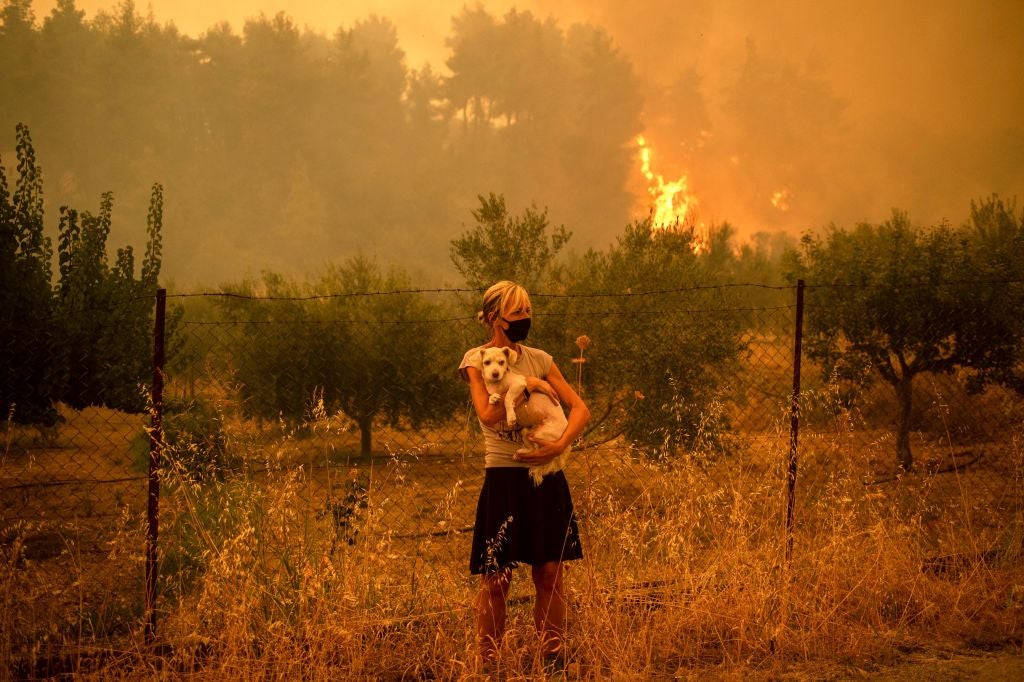We can’t ‘win’ against the climate crisis – so we’re just going to have to adapt instead
There cannot be a national approach to a global issue such as climate change, say Anne-Marie Trevelyan and Yasmine Fouad. Leaders at Cop26 must recognise this and meet demand for resilience across the world


With some of the worst wildfires and floods on record, 2021 has sounded the alarm on the need for urgent action to address the impacts of climate change. As we go into the second week of the Cop26 summit, the clock is ticking.
The science is clear. As the UN secretary general said recently following the Intergovernmental Panel on Climate Change (IPCC) report, this is truly a “code red” for humanity.
Even if we can keep the Paris Agreement’s goal of limiting global warming to 1.5 degrees alive, we will need to adapt to existing climate impacts. From intense wildfires and deadly floods across Europe and the US, to increasingly ferocious storms hitting small island states across the Caribbean, Pacific and Asia, climate impacts are already affecting us all.
Adaptation is firmly on the global agenda, with action and commitments to match.
Cop26 has been the culmination of this momentum. Norway committed to triple its adaptation finance, and Japan and Australia will double theirs. The US made its largest adaptation finance commitment to date, and Canada committed to allocate 40 per cent of its climate finance to adaptation.
Leading by example, the UK doubled its international climate finance commitment to £11.6bn over five years in 2019, striving for a balance between adaptation and mitigation. The prime minister’s announcement last week would take this to £12.6bn, if our economy grows as forecast.
Meanwhile, global commitments to protect and restore nature, including the Glasgow Leaders’ Declaration to halt and reverse deforestation, will reap adaptation benefits for local communities too, harnessing the forces of nature to protect them from climate shocks.
We have welcomed countries’ own national plans for building resilience, with 33 Adaptation Communications submitted to the UN in the run up to and at Cop26 – up from only three a year ago. These, alongside full National Adaptation Plans, enable countries to understand the risks, design solutions and allocate resources to take real world action.
This cannot be a national approach to a global issue. As the UNEP’s Adaptation Gap reports conclude, while national adaptation planning, finance and implementation is accelerating, we must increase ambition to meet the rising need for resilience across the world.
It starts with supporting local communities and ensuring our vital infrastructure, from hospitals and transport to agriculture, can cope with the impacts of climate change.
From early warning systems, to climate-resilient seeds and crops, with the power of innovation and technology, we already have answers. Done well, effective adaptation is also its own economic opportunity, with potential to protect livelihoods as well as create new jobs and deliver sustainable growth.
In Africa, weather forecasting and early warning systems in Lake Victoria not only saves over 300 lives a year, but also protects livelihoods, saving fishermen thousands of pounds in damages.
In fact, across Africa, this kind of preparedness has helped bring lives lost to climate disasters down from 679,000 between 1970 and 1989 to only 44,000 in the last 20 years.
Where we can, we must empower local communities to take the lead on implementing the solutions that work for them. The World Bank’s Financing Locally-Led Climate Action programme launched at Cop last week, will empower citizens to identify and invest in climate solutions.
To keep up to speed with all the latest opinions and comment sign up to our free weekly Voices Dispatches newsletter by clicking here
Simple and sustainable solutions to reduce climate impacts exist. Now is the time to implement them, sharing experiences of what works and ensuring solutions are matched to the diverse local contexts where they are needed.
The UK and Egypt have been working closely on this issue as co-chairs of the Adaptation Action Coalition, which was launched in January and now includes nearly 40 countries committed to working on practical solutions to achieve a climate resilient world by 2030. We will be further deepening this partnership and working closely together on adaptation to climate impacts together ahead of Cop27.
Tomorrow, Cop26’s Adaptation, Loss and Damage Day will be a moment to hear from those on the frontline of climate change across the world, from public and private sector experts, scientists, young people, women and girls and others to re-imagine and shape a more resilient future.
Together, we have the opportunity to listen and to commit to building the local, national and global resilience that will help us all to weather the coming storm.
Dr Yasmine Fouad is minister of environment for the Arab Republic of Egypt.
Anne-Marie Trevelyan is UK international champion on adaptation and resilience for the Cop26 presidency and secretary of state for international trade and president of the Board of Trade






Join our commenting forum
Join thought-provoking conversations, follow other Independent readers and see their replies
Comments